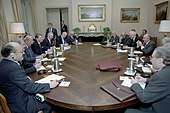Trust, but verify
Trust, but verify (Russian: Доверя́й, но проверя́й, tr. Doveryáy, no proveryáy, IPA: [dəvʲɪˈrʲæj no prəvʲɪˈrʲæj]) is a rhyming Russian proverb. The phrase became internationally known in English when used by President Ronald Reagan on several occasions in the context of nuclear disarmament discussions with the Soviet Union.
Soviet–American relations

Suzanne Massie, an American writer, met with President Ronald Reagan many times between 1984 and 1987.[1] She taught him the Russian proverb Doveryai, no proveryai (Russian: Доверяй, но проверяй; Trust, but verify), advising him that "The Russians like to talk in proverbs. It would be nice of you to know a few. You are an actor – you can learn them very quickly."[2] The proverb was adopted as a signature phrase by Reagan, who used it frequently when discussing U.S. relations with the Soviet Union.[3] Using proverbs that the Russians could relate to may or may not have helped relations between the two leaders.[4][5]
After Reagan used the phrase to emphasize "the extensive verification procedures that would enable both sides to monitor compliance with the treaty",[6] at the signing of the INF Treaty, on 8 December 1987,[notes 1] his counterpart General Secretary Mikhail Gorbachev responded, "You repeat that at every meeting". To this, Reagan answered, "I like it".[3][7][8] While Reagan quoted Russian proverbs, Gorbachev quoted Ralph Waldo Emerson, who had been popular in the USSR when Gorbachev was in college, saying that "The reward of a thing well done is to have done it."[4][6]
Following the 2013 Ghouta attacks, Secretary of State John Kerry told a news conference in Geneva that the United States and Russia had agreed on a framework to dispose of Syria's chemical weapons. He said "President Reagan's old adage about 'trust but verify' ... is in need of an update. And we have committed here to a standard that says 'verify and verify'."[9][10]
Influence
In 1995, the similar phrase "Trust and Verify" was used as the motto of the On-Site Inspection Agency (now subsumed into the Defense Threat Reduction Agency).[11]
In 2000, David T. Lindgren's book about how interpretation, or imagery analysis, of aerial and satellite images of the Soviet Union played a key role in superpowers and in arms control during the Cold War was titled Trust But Verify: Imagery Analysis in the Cold War.[12][13]
In 2001, the National Infrastructure Protection Center (NIPC), a national critical infrastructure threat investigation and response entity, published a paper entitled "Trust but verify" on how to protect oneself and their company from email viruses.[14]
In 2015, both Democrats and Republicans invoked the phrase when arguing for and against the proposed Iran nuclear deal framework.[3]
In the study of programming languages, the phrase has been used to describe the implementation of downcasting: the compiler trusts that the downcast term will be of the desired type, but this assumption is verified at runtime in order to avoid undefined behavior.[15]
In 2019, this quote was used in 3rd episode of HBO miniseries Chernobyl, by the deputy director of Soviet KGB.
Origins
The origin of the Russian proverb is obscure, though both Vladimir Lenin and Joseph Stalin are reputed to have used variants of it [5](Faites confiance, mais vérifiez).
Notes
- The Intermediate Nuclear Force Treaty (INF) aimed to eliminate short and medium range nuclear weapons from their respective national arsenals (Watson 2011). Watson described it as a "written embodiment of Gorbachev’s policies and personality based on a life spent in and out of the Soviet Union."
References
- "The Reagan Years". Suzanne Massie.
- Suzanne Massie speaking on the 22nd Episode of the television documentary, Cold War (TV series).
- Barton Swaim (11 March 2016). "'Trust, but verify': An untrustworthy political phrase". The Washington Post. Retrieved 25 June 2019.
- Shanker, Thom (December 9, 1987). "Battle Turns Gentle With Proverbs Galore". Chicago Tribune. Retrieved May 3, 2017.
- Shevchenko, Nikolay (2019-06-17). "Did Reagan really coin the term 'Trust but verify,' a proverb revived by HBO's Chernobyl?". Russia Beyond. Retrieved 2020-06-20.
- Shipler, David K. (9 December 1987). "Reagan and Gorbachev Sign Missile Treaty and Vow to Work for Greater Reductions". New York Times.
- "Remarks on Signing the Intermediate-Range Nuclear Forces Treaty", 1987-12-8. Retrieved on 2009-4-8.
- Watson, William D. (Fall 2011). "Trust, but Verify: Reagan, Gorbachev, and the INF Treaty". Hilltop Review. Western Michigan University. 5.
- "Kerry, Lavrov: Syria to Give Up the Stash in 1 Week—Maybe". The Jewish Press. September 14, 2013. Retrieved September 15, 2013.
- Chu, Henry (September 14, 2013). "U.S., Russia agree on a disposal plan for Syria's chemical weapons". Los Angeles Times. Retrieved September 15, 2013.
- "DoD News Briefing: Brigadier General Gregory G. Govan, USA, On-Site Inspection Agency". United States Department of Defense. February 22, 1995. Retrieved November 26, 2016.
- Lindgren, David T. (November 2000). Trust But Verify: Imagery Analysis in the Cold War. Annapolis, Md.: Naval Institute Press. pp. xiii+222.
- Day, Dwayne A. (October 2001). "Trust but Verify: Imagery Analysis in the Cold War (review)". Technology and Culture. 42 (4): 822–823. doi:10.1353/tech.2001.0156.
- Trust but verify [electronic resource] : a guide to using e-mail correspondence (Report). Washington, D.C.: National Infrastructure Protection Center (U.S.). 2001.
- Pierce, Benjamin (2002). Types and Programming Languages. Cambridge, MA, USA: MIT Press. p. 194. ISBN 0-262-16209-1.
External links
- Trust but verify excerpt from Reagan and Gorbachev press conference